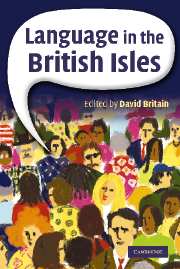Book contents
- Frontmatter
- Contents
- List of figures
- List of tables
- List of contributors
- Acknowledgements
- Map of the British Isles
- Introduction
- Part I English
- 1 The history of English
- 2 Standard and non-standard English
- 3 Phonological variation in England
- 4 Grammatical variation in England
- 5 Scottish English and Scots
- 6 Northern Irish English
- 7 Southern Irish English
- 8 English in Wales
- 9 English on the Isle of Man
- 10 English in the Channel Islands
- Part II The Celtic Languages
- Part III The Other Languages of the British Isles
- Part IV Applied Sociolinguistic Issues
- References
- Index
7 - Southern Irish English
Published online by Cambridge University Press: 16 January 2010
- Frontmatter
- Contents
- List of figures
- List of tables
- List of contributors
- Acknowledgements
- Map of the British Isles
- Introduction
- Part I English
- 1 The history of English
- 2 Standard and non-standard English
- 3 Phonological variation in England
- 4 Grammatical variation in England
- 5 Scottish English and Scots
- 6 Northern Irish English
- 7 Southern Irish English
- 8 English in Wales
- 9 English on the Isle of Man
- 10 English in the Channel Islands
- Part II The Celtic Languages
- Part III The Other Languages of the British Isles
- Part IV Applied Sociolinguistic Issues
- References
- Index
Summary
Introduction
The English language was taken to Ireland with the settlers from Britain who arrived in the late twelfth century. Since then the fate of English has been closely linked with that of the Irish language which it came largely to replace in the late modern period. In addition the interaction of existing forms of English with the Scots imported in the early seventeenth century in the north of the country led to a linguistic division arising between Ulster, the most northerly province, on the one hand, and the rest of the country to the south on the other. This state of affairs provides the rationale for two chapters on Ireland within the current volume.
For the many varieties of English on the island of Ireland there are different designations. In the north of the country terms are used which reflect historical origins, e.g. Ulster Scots for the English stemming from the initial Lowland Scots settlers, Mid Ulster English for geographically central varieties which are largely of northern English provenance. Contact English is found occasionally to refer globally to varieties spoken in areas where Irish is also spoken. In general treatments of English in the south of Ireland three main terms are to be found.
- Type
- Chapter
- Information
- Language in the British Isles , pp. 135 - 151Publisher: Cambridge University PressPrint publication year: 2007
- 8
- Cited by



